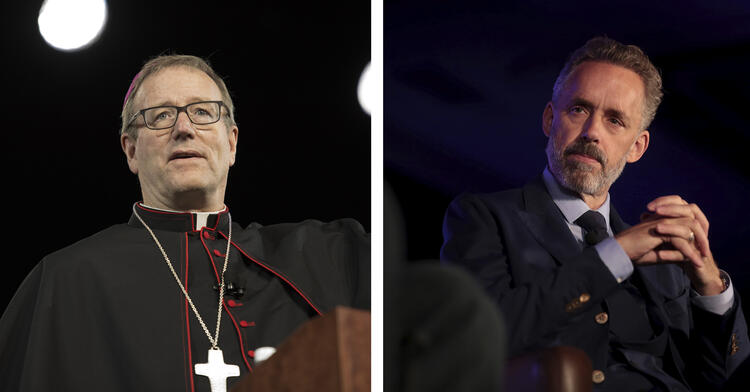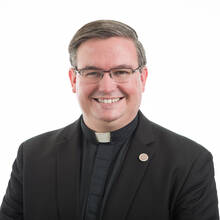“If the reader thinks my translation a bad one, let him try his own; if he thinks it good, let him learn Italian.”
These words from Harvey C. Mansfield’s translation of The Prince came to me recently as I listened to a much-anticipated conversation between Bishop Robert Barron and Jordan Peterson.
Bishop Barron, an auxiliary bishop of Los Angeles and the founder of Word on Fire Catholic Ministries, has written and spoken in a number of places about Jordan Peterson, a Canadian psychology professor famous for his public resistance to political correctness and his tough-love message, which is aimed especially at young men and reaching an increasingly wide audience on social media. Supposedly at the prompting of both their fan bases, the two sat down for an interview in March 2019, which was recently released as a podcast and video.
Bishop Barron has received both praise and criticism for his engagement with Mr. Peterson’s thought, particularly after the bishop invoked him at the annual June meeting of the U.S. Conference of Catholic Bishops. Bishop Barron recently told America that he is attracted to Mr. Peterson’s “intellectual approach,” which is “proving so efficacious on social media.” Bishop Barron has been praised for bringing about this meeting of “great minds” in a rare model of dialogue between Christians and non-Christians both committed to reasoned and compelling inquiry that has attracted wide audiences. Critics, however, argue that Mr. Peterson’s thought is deeply opposed to that of Christianity and that he promotes a misogynistic, illiberal form of politics. They argue that Bishop Barron’s embrace of Mr. Peterson evinces a “spiritual worldliness” that is more manipulative than evangelical.
I may be one of the few people who are sympathetic to both the criticism and the praise.
At his best, Bishop Barron is not asking us to universalize what he is doing. Yes, he has strong opinions about evangelization, particularly that it should be oriented toward beauty as a means to the truth. But, just like any other evangelist, fundamentally, he is navigating a particular relationship with prudence, aware of his gifts and limitations. You can disagree with how he does it and with whom he does it, but Bishop Barron is simply giving us one model for evangelization among many. When many of his supporters and critics act as though it were the only model, they take him more seriously than he himself does.
Here is what critics don’t understand: Bishop Robert Barron is not simply engaging in this dialogue for the benefit of some third party. He is doing it to engage Mr. Peterson. I think Bishop Barron thinks that Jordan Peterson himself is coming around. Bishop Barron is not just using Mr. Peterson to model civil dialogue; Bishop Barron wants to convert Mr. Peterson.
Bishop Robert Barron wants to convert Jordan Peterson.
There are significant differences between Bishop Robert Barron and Jordan Peterson, and I think Bishop Barron understands those differences better than Mr. Peterson does. Mr. Peterson made several claims in the conversation that Bishop Barron could have seized upon to criticize. But Bishop Barron wants to advance the conversation, and so for the most part he is happy to emphasize the commonalities. Others in Catholic media could learn from this model.
The Catholic Church needs to maintain its intellectual traditions, and as a Jesuit I am the last person to deny the close linkage between action and contemplation. But I wonder if the emphasis in U.S. Catholic culture has shifted in an unhealthy way toward analysis and criticism rather than action.
Our society and church clearly need more people committed to finding common ground. And it is not clear that such common ground is always a matter of ideas. Perhaps part of the cause of our polarization today is that we focus on theories so divorced from experience that we lose all hope of appealing to and learning from our common experiences as humans, Americans and Chrisitans. If we allowed the example of people like Bishop Barron to challenge us practically as well as theoretically, we might be able to turn down the temperature on our debates and re-orient them to the concrete needs of the church.
Even groups who find Bishop Barron’s techniques problematic should see a reflection of their own efforts. Many Catholics use similar methods with those on the political left, including thoroughly secular groups working on labor, ecology and women’s rights. They find common ground, they are respectful about their differences and they work toward common goals. And I think that’s good.
At some point, however, Bishop Barron’s example is not simply something to be studied: It should be acted upon. We need to get off the sidelines and try our own hand at evangelization.
If you like what Bishop Barron is doing, go out and find your own way of doing it yourself. If you do not, then by all means share your concerns. But do not stop there, and maybe even skip that step if it is keeping you from putting your love of God into action.











Peterson is a practitioner of junk science, and absent of faith. Baron is being used.
Catholic Natural Law uses junk science too.
Didn't we just talk about this? Evangelization is about realizing that Hell is in the here and now. Christ is the way out. He has experienced our pain on the cross. Salvation is not about enforcing morality, it is about transcending it. Find the Lord in the poor, not the powerful.
I can see where Peterson needs evangelizing, but it should be done personally, not over the air. I am also fairly sure Barron is not transmitting the right message. He preaches certainty. This misses the point. Faith is not loyalty.
Barron is a Steve Bannon/Raymond Burke disciple. He works with the alt-right movement to remove Pope Francis. Nothing he does or says should be considered Evangelization but should be considered political rhetoric.
Mark... the Bishop is a disciple... of Jesus Christ. And he was elevated by Pope Francis.
even popes can make mistakes in whom they ''elevate.'' we see that every day.
Evangelization is the genesis of creating new possibilities that didn’t exist before through conversion. Barron is asking Jordon Peterson to dump his life work something he would never do himself.
The article makes a good main point: seek common ground, build from there. But as I see it common ground workds best when both sides respectfully spell out their differences as well.
if more Catholic bishops thought and spoke as well as Peterson we would not be having this conversation. Peterson is a thoughtful, articulate, well read professor who presents his arguments cogently and persuasively. I find the man very authentic and worth listening to, without jargon or sloganeering. He has been very misrepresented by social media which finds him difficult to pigeonhole, therefore they keep sticking labels on him, so they can stop thinking and just hurl labels at him in the hope that some will stick and then they can just stop listening to his real message..
You're spot on about Peterson being misrepresented. He is indeed difficult to pigeonhole. His economic views seem to be slightly to the right.
I bought and watched Bishop Barron’s “Catholicism” series. Some aspects of it were good, but I quit paying attention to him when I realized how sexist he is. Apparently he has sexism in common with Jordan Peterson, whom I have never paid attention to.
Though it's usually not the first thing an evangelizer says (though it often is for Protestant evangelizers), ultimately the message is something like this: "You are fundamentally evil and in need of salvation. You will go to hell if you do not achieve/accept it." Ultmately, damnation becomes the consequence if one does not live one's life as prescribed by Catholic doctrine--ALL of Catholic doctrine--much of which is a disaster: women not appropriate in the hierarchy, divorced/improperly remarried people not allowed in communion, gay people not allowed in marriage (or communion), contraception not allowed in marriage, sex not allowed before marriage, masturbation not allowed any time, etc. Ultimately, the gospel message becomes more a side-note to doctrinal obedience. So what's the puropse of evangelizing people into that? Most people are decent (not evil) and are not in need of religion to save them from an invented eternal torment. Most people live their lives by the gospel message already, and not because they're afraid of going to hell, which is better than someone who is obsessed with adhering to a doctrine because they ARE afraid of going to hell. The truly evil people in the world are not going to listen either way. So why do we need evangelization?
You need evangelization to overcome this completely false portrayal of the Church and its message.
How is this portrayal false? You can't just speak ex cathedra.
Barron is one of these humans which we 'can see them coming' even before they arrive. his 'regalia' puts me off right away..... his facial expressions of feigned humility is right behind.
I would have more sympathy for Bishop Barron if he had said even a word of support for the Catholic Day of Action for Immigrant Children. His silence wasn’t just conspicuous, it was deafening. I guess the poor & marginalized don’t have the internet profile of Jordan Peterson.
Bishop Barron criticizes the “far” Left on a regular & ongoing basis— a quick perusal of his videos and/or speeches will establish this. What is wholly absent from Barron’s talks is a similar critique of the Right. Barron is disingenuous when he says he’s not interested in Peterson’s ideas. For anyone paying attention, Barron’s political sympathies are self-evident... and they are problematic.
JORDAN PETERSON MAKES A LOT OF SENSE
Jordan Peterson must be thinking and saying something that makes a lot of sense. That’s why thousands of people all over the world listen to him. To my mind, he’s a Scholastic” a la St. Thomas Aquinas, unafraid to use the great tool of the intellect. But in this era of feeling and emotions, of political correctness and dysphorias, the use of the intellect is dangerous because it dares to tell us that “Nothing unreal exists”— and that “Nothing real can be threatened.” This is indeed a scary proposition for us moderns of the 2nd Millennium.... I hope that one day Jordan Peterson will also be using the second great Scholastic tool: “fides.” Fides et Ratio = faith and reason. Elementary, my dear Watson....
Plato differentiated between “dialectic” and “eristic”. Dialectic is dialogue for the sake of truth. Eristic is dialogue for the sake of proving the other wrong. If Baron is engaging Peterson for the sake of winning him over, as Fr. McCormick mentions, than it’s working off a dishonest premise, i.e. “I’m right and you’re wrong.” This is destructive of ecumenism, in this case with a humanist. Fruitful dialogue calls for both commitment to one’s view and openness to sincere critique.